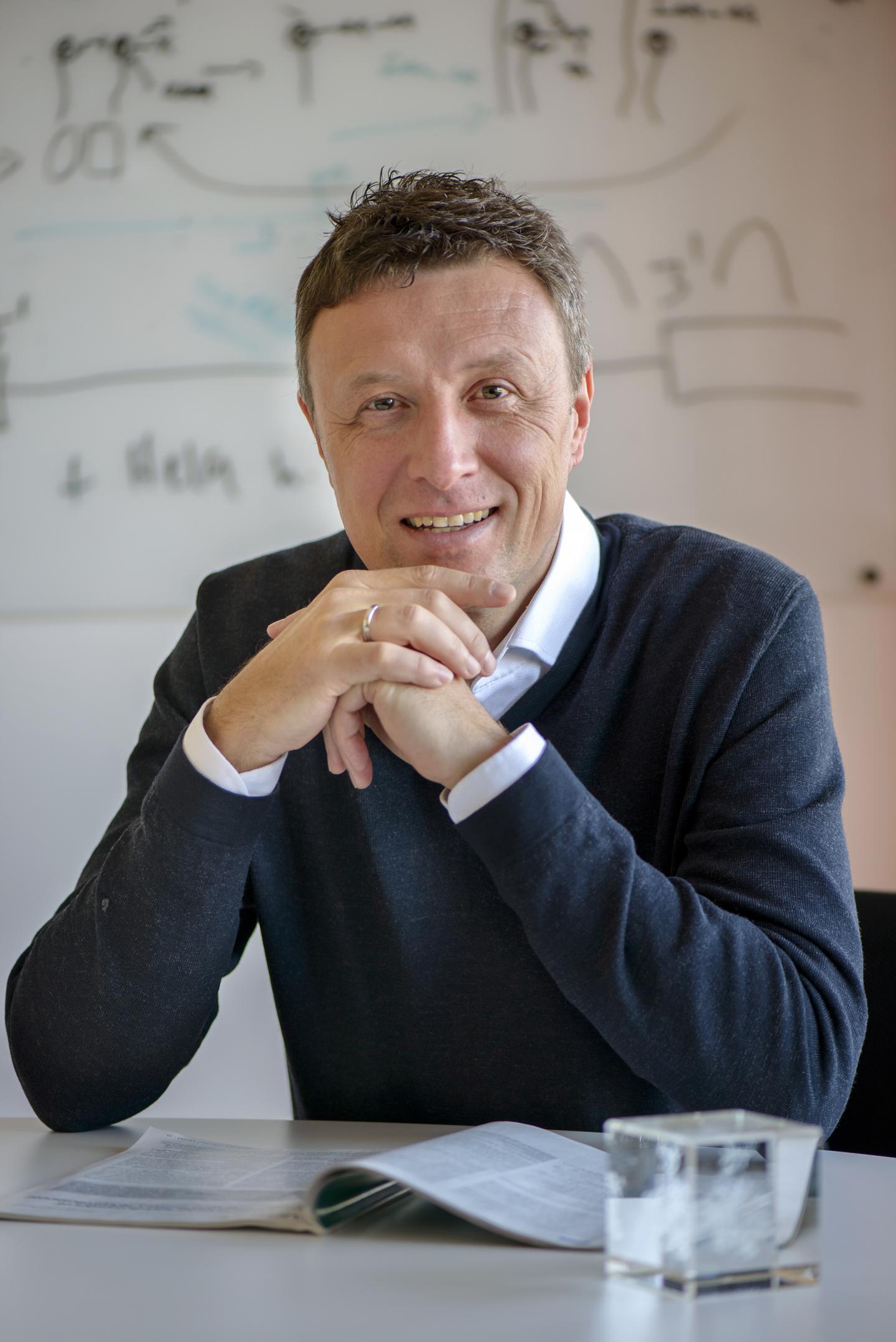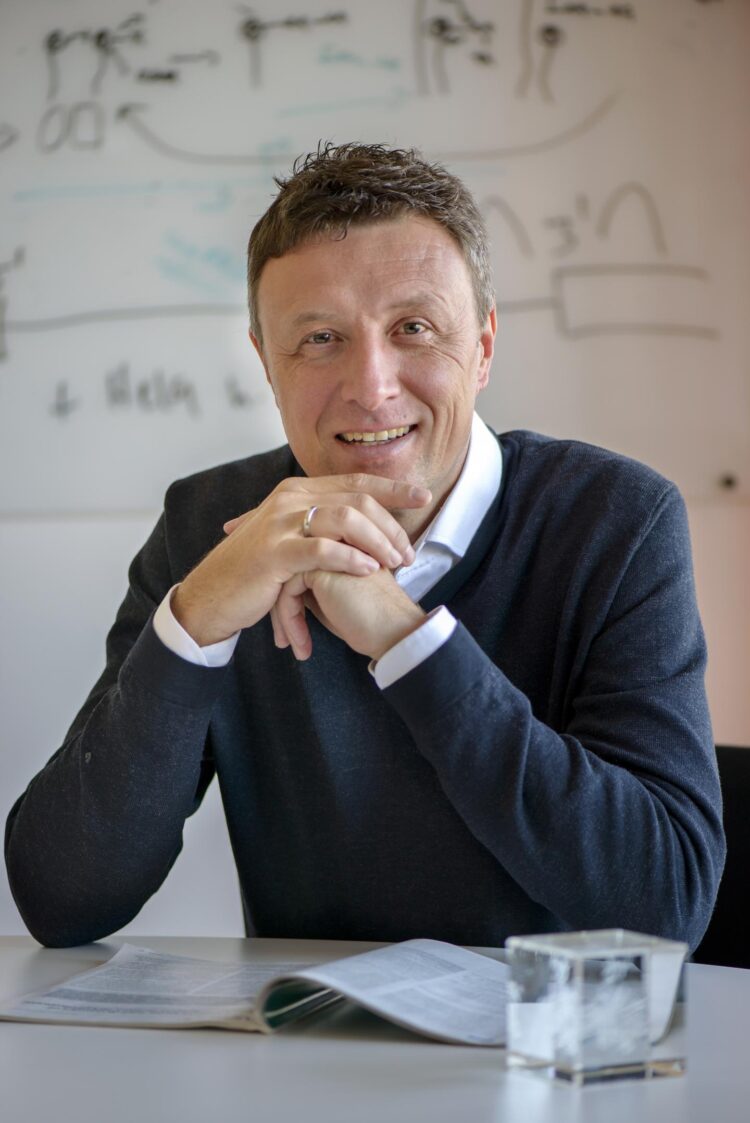The director at the Max Planck Institute for Biophysical Chemistry is honored for his pioneering work in the field of gene transcription

Credit: Irene Böttcher-Gajewski / Max Planck Institute for Biophysical Chemistry
The award is one of the most prestigious in Europe and endowed with 500,000 Swiss francs. With this prize the Louis-Jeantet Foundation honors the director at the Max Planck Institute (MPI) for Biophysical Chemistry for his pioneering work in the field of gene transcription. Transcription is a copying process enabling living cells to produce transcripts of their genes that then serve as blueprints for making proteins. Cramer’s research focuses on the molecular machines, called RNA polymerases, that control this fundamental process of life.
“Patrick Cramer has visualized the structures of many of these cellular copying machines in atomic detail for the first time. He demonstrated how RNA polymerases translate genetic information and how they work as a team with other protein complexes. His ground-breaking research provides deep insights into gene transcription with unprecedented detail. It is highly deserved that his outstanding achievements are now being honored with the Louis Jeantet Prize,” says Marina Rodnina, Managing Director at the MPI for Biophysical Chemistry.
With his research, Patrick Cramer also wants to understand how the cellular copying machines are controlled. After all, the genetic information is identical in all cells, but read out only on demand. It is through this precise control of transcription that a complex organism with specialized cells as diverse as skin, nerve or liver cells can develop. To understand transcription and gene regulation at the molecular and cellular levels, the molecular biologist combines a wide variety of methods in his research group, from biochemistry and electron microscopy to functional genomics and bioinformatics. “It is a special honor to receive the Louis-Jeantet Prize. I am very grateful to the many coworkers who have contributed over the years with their outstanding research. I hope that soon we will all be vaccinated and can celebrate this success,” says Cramer.
The molecular biologist plans to use the prize money for his research on the new coronavirus, among other things. Shortly after the pandemic started, Cramer’s group filmed how the coronavirus duplicates its genetic material and which three-dimensional structure the pathogen’s polymerase adopts during copying. Recently, Cramer’s group also visualized how the drug remdesivir interferes with this copying process. Remdesivir was the first drug to be approved in Europe and the United States to treat Covid-19 infections. Cramer’s team described how remdesivir impairs copying of the viral genome, and that it does not block this process completely. “Our results can explain, at least in part, why the drug is not as effective as had been expected,” Cramer says. “It is now an important goal to develop molecules that can inhibit the corona polymerase more efficiently.”
###
About Patrick Cramer
Patrick Cramer studied chemistry in Stuttgart, Heidelberg, as well as Bristol and Cambridge (England). After completing his PhD at the European Molecular Biology Laboratory in Grenoble (France), he worked as a postdoctoral researcher with future Nobel laureate Roger Kornberg at Stanford University in California (USA) from 1999 to 2001. He was then appointed as professor of biochemistry at the Ludwig-Maximilians-Universität in Munich, where he also headed the Gene Center from 2004 to 2013. Since 2014, Cramer has been director at the MPI for Biophysical Chemistry in Göttingen heading the Department of Molecular Biology. Cramer has received many awards, including the Ernst Jung Prize for Medicine, the Gottfried Wilhelm Leibniz Prize, the Otto Warburg Medal, and the Order of Merit of the Federal Republic of Germany. He is a member of the European Molecular Biology Organization, the National Academy of Sciences Leopoldina, and the U.S. National Academy of Sciences.
About the Louis-Jeantet Prizes
The Swiss Louis-Jeantet Foundation awards up to three Prizes annually to scientists conducting research in the field of biomedicine and working in one of the member states of the European Council. Patrick Cramer is already the fourth scientist at the MPI for Biophysical Chemistry to be recognized with this award, following Bert Sakmann, Peter Gruss, and Herbert Jäckle.
Media Contact
Dr. Carmen Rotte
[email protected]
Original Source
https:/





